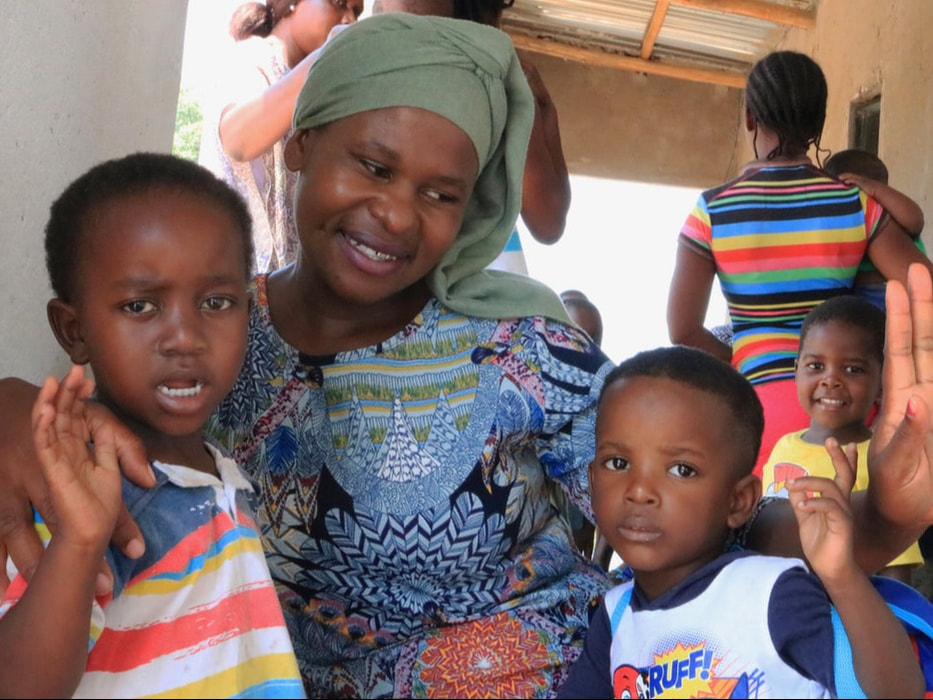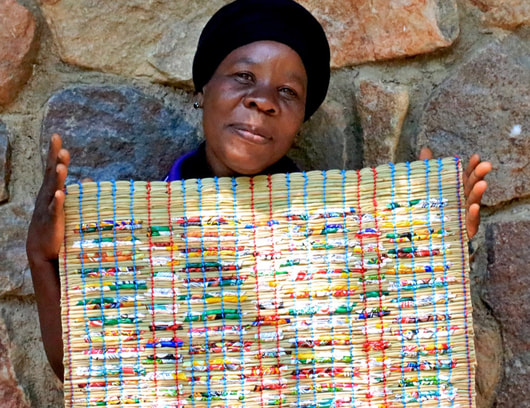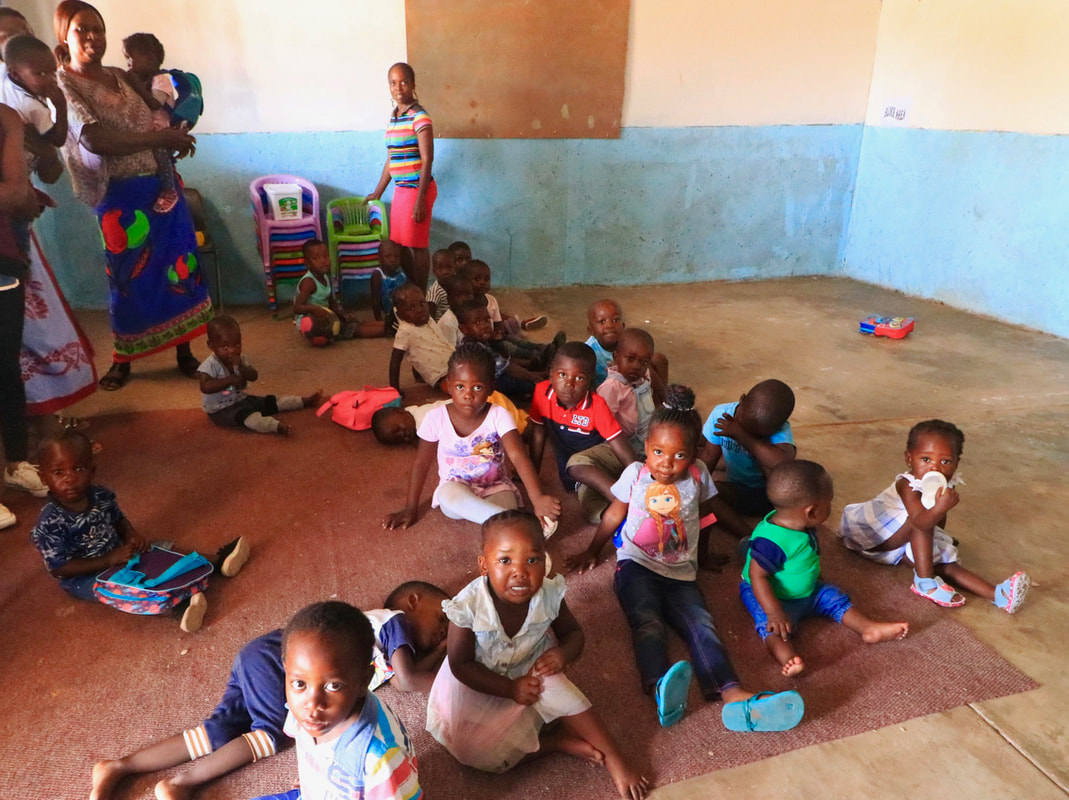Tsundzukani Bright Eye's Daycare Centre
Acornoek, Mpumalanga, South Africa
The Tsundzukani Bright Eye's Day Care Centre is located in White City village within the Acornhoek area in Mpumalanga Province of South Africa. It was established in 2019 by Xitsundzuxo Kgopotso Nyango, a native of the MaShangaan tribe. The name Tsundzukani was inverted from her name Xitsundzuxo, meaning Remember. Xitsundzuxo is a 31-year-old phenomenal woman who has so much love for children. "I started this school because I love children with all my heart," she said. "Seeing them all gathered here at school completes my life.” She she has been successfully administering the Centre assisted by other dedicated indigenous women. She has a college diploma in Public Management and Computer Sciences, and holds a SACE teaching certificate.
According to Ms. Nyango the Daycare Centre’s mission is to academically prepare the young children from surrounding rural communities so that they will be able to be successful in the modern world of today. In order to efficiently accomplish this task, they must be able to develop a strong foundation, thus brightening their future with various basic skills. Simultaneously they will also learn their culture, customs, history and religion. She strongly believes that indigenous rural children must get an equal education as those who live in the urban areas of the country. "People from this community has been very supportive and I'm truly grateful for that," she said.
The Daycare Center is an invaluable resource for a number of families in the community. Parents are charged a very affordable monthly fee, and in return their children are provided with education and nutritious meals throughout the day. It opens from six o’clock in the morning until seven o’clock in the evening since some of the children's parents are working. Remember believes that the goal of the daycare centre should be to equip children with the academic skills that will prepare them for the modern world. But she also places a heavy emphasis on teaching traditional history, customs, and practices.
The Centre is also used as a venue for the community’s official meetings and events thus making it even more precious and useful to the village of Acornoek.
According to Ms. Nyango the Daycare Centre’s mission is to academically prepare the young children from surrounding rural communities so that they will be able to be successful in the modern world of today. In order to efficiently accomplish this task, they must be able to develop a strong foundation, thus brightening their future with various basic skills. Simultaneously they will also learn their culture, customs, history and religion. She strongly believes that indigenous rural children must get an equal education as those who live in the urban areas of the country. "People from this community has been very supportive and I'm truly grateful for that," she said.
The Daycare Center is an invaluable resource for a number of families in the community. Parents are charged a very affordable monthly fee, and in return their children are provided with education and nutritious meals throughout the day. It opens from six o’clock in the morning until seven o’clock in the evening since some of the children's parents are working. Remember believes that the goal of the daycare centre should be to equip children with the academic skills that will prepare them for the modern world. But she also places a heavy emphasis on teaching traditional history, customs, and practices.
The Centre is also used as a venue for the community’s official meetings and events thus making it even more precious and useful to the village of Acornoek.
Here is a quick rundown of the various improvements Plenty Canada has made to the Daycare Centre:
Creating a rainwater storage system — Though the children are given nutritious meals each day, the centre originally did not have any running water, something many of us take for granted. With the installation of a storage system for rainwater, the center gained access to a consistent source of water for cooking, washing, and irrigation. Any excess water will be purified and given to the children to be used as additional drinking water. The installation of this system has had an incalculably large effect on the daily lives of the children and the instructors, allowing them to focus on their bright futures rather than their daily needs.
Growing a vegetable garden — Already, a space has been established on the Daycare Centre's property for a vegetable garden. Keeping sustainability in mind, water from the previously mentioned rainwater storage system is used to irrigate the garden. We funded the installation of a fence around the garden, which will ensure that all of the products are protected from animals year-round. By respecting the knowledge of the instructors and volunteers in the local area, we have aided in creating a sustainable space for the growing of local herbs that will both supplement the diet of the children and be utilized as traditional medicine.
Purchasing traditional mats — Beyond the basic necessities such as food, water, and education, we wanted to help create a more comfortable space for the rural children of Acornoek to also appreciate and learn traditional skills. Originally, the Daycare Centre's cold cement floors are completely unfurnished. This can obviously be quite uncomfortable for the children, especially when they choose to nap between classes. In response, we purchased mats to line the floors. Rather than buying commercial flooring, however, we purchased traditional grass mats from Ms. Chester Mathebula, a local Indigenous woman from the Pedi tribe. Given that the weaving of grass mats is a local practice, she will held a live matt-making demonstration at the centre. The children will were introduced to their traditional arts while they received objects of material comfort that help enable them to focus on their learning.
Completing sanitation facilities — With your generous support, we provided the necessary funds to complete the double-unit toilet on the Daycare Centre grounds. The work has halted due to a lack of funds, but with your help we were able to successfully purchase the required building materials, including doors, windows, and cement.
Kitchen upgrade — The original Center's kitchen facilities were very rudimentary, therefore, our project was based on an upgrade of the entire building structure into a more adequate standard to provide a healthy and safe environment for large scale meal preparation. This included increasing the size of the building structure, adding roof trusses, plastering of the exterior walls, new galvanized roof sheets, interior wooden structure to support the ceiling, cornices, two new concrete tables around the interior walls, painting, and a new large window to bring more light and fresh air into the kitchen environment, with a view to the vegetable garden. A extra rain catchment and storage system was installed in order to provide a separate running water supply to the kitchen facilities. This improvement will make the meal preparations and clean up easier and more sanitary, as currently there was previously no direct running water line into the building.
New classroom -- A second classroom was built in order to accomodate the increasing demand for student enrollment at the centre. The new classroom has doubled the capacity of the school, accomodating approximately 30-40 additional students.
Creating a rainwater storage system — Though the children are given nutritious meals each day, the centre originally did not have any running water, something many of us take for granted. With the installation of a storage system for rainwater, the center gained access to a consistent source of water for cooking, washing, and irrigation. Any excess water will be purified and given to the children to be used as additional drinking water. The installation of this system has had an incalculably large effect on the daily lives of the children and the instructors, allowing them to focus on their bright futures rather than their daily needs.
Growing a vegetable garden — Already, a space has been established on the Daycare Centre's property for a vegetable garden. Keeping sustainability in mind, water from the previously mentioned rainwater storage system is used to irrigate the garden. We funded the installation of a fence around the garden, which will ensure that all of the products are protected from animals year-round. By respecting the knowledge of the instructors and volunteers in the local area, we have aided in creating a sustainable space for the growing of local herbs that will both supplement the diet of the children and be utilized as traditional medicine.
Purchasing traditional mats — Beyond the basic necessities such as food, water, and education, we wanted to help create a more comfortable space for the rural children of Acornoek to also appreciate and learn traditional skills. Originally, the Daycare Centre's cold cement floors are completely unfurnished. This can obviously be quite uncomfortable for the children, especially when they choose to nap between classes. In response, we purchased mats to line the floors. Rather than buying commercial flooring, however, we purchased traditional grass mats from Ms. Chester Mathebula, a local Indigenous woman from the Pedi tribe. Given that the weaving of grass mats is a local practice, she will held a live matt-making demonstration at the centre. The children will were introduced to their traditional arts while they received objects of material comfort that help enable them to focus on their learning.
Completing sanitation facilities — With your generous support, we provided the necessary funds to complete the double-unit toilet on the Daycare Centre grounds. The work has halted due to a lack of funds, but with your help we were able to successfully purchase the required building materials, including doors, windows, and cement.
Kitchen upgrade — The original Center's kitchen facilities were very rudimentary, therefore, our project was based on an upgrade of the entire building structure into a more adequate standard to provide a healthy and safe environment for large scale meal preparation. This included increasing the size of the building structure, adding roof trusses, plastering of the exterior walls, new galvanized roof sheets, interior wooden structure to support the ceiling, cornices, two new concrete tables around the interior walls, painting, and a new large window to bring more light and fresh air into the kitchen environment, with a view to the vegetable garden. A extra rain catchment and storage system was installed in order to provide a separate running water supply to the kitchen facilities. This improvement will make the meal preparations and clean up easier and more sanitary, as currently there was previously no direct running water line into the building.
New classroom -- A second classroom was built in order to accomodate the increasing demand for student enrollment at the centre. The new classroom has doubled the capacity of the school, accomodating approximately 30-40 additional students.
It’s important for Plenty Canada to remain active in southern Africa. Years of hard and effective work in the countries of Lesotho, Botswana, Zambia, Swaziland, and South Africa have informed Plenty Canada’s organizational background, experience, and values.



